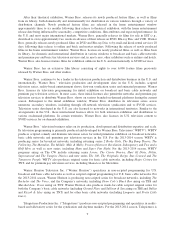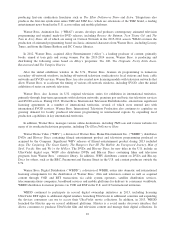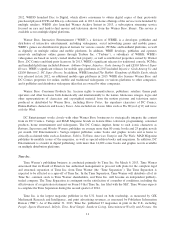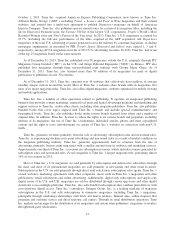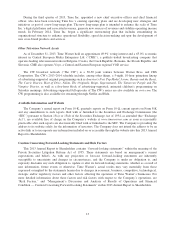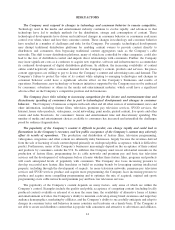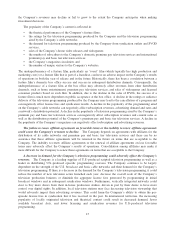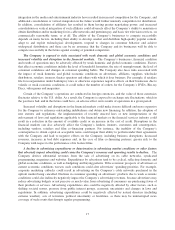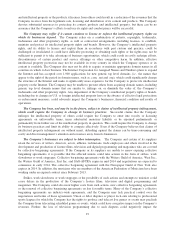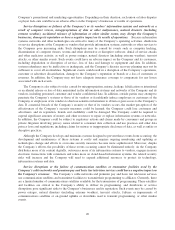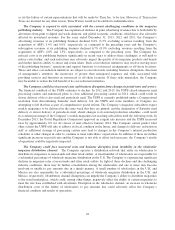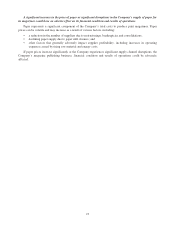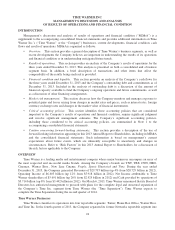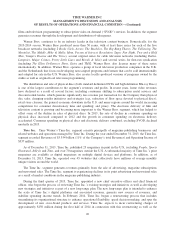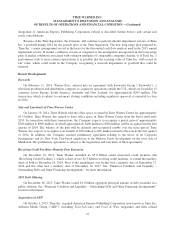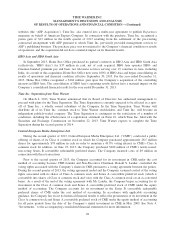Time Magazine 2013 Annual Report Download - page 35
Download and view the complete annual report
Please find page 35 of the 2013 Time Magazine annual report below. You can navigate through the pages in the report by either clicking on the pages listed below, or by using the keyword search tool below to find specific information within the annual report.and intellectual property or the products it licenses from others could result in a reduction of the revenues that the
Company receives from the legitimate sale, licensing and distribution of its content and products. The Company
devotes substantial resources to protecting its content, products and intellectual property, but there can be no
assurance that the Company’s efforts to enforce its rights and combat piracy will be successful.
The Company may suffer if it cannot continue to license or enforce the intellectual property rights on
which its businesses depend. The Company relies on a combination of patents, copyrights, trademarks,
tradenames and other proprietary rights, as well as contractual arrangements, including licenses, to establish,
maintain and protect its intellectual property rights and brands. However, the Company’s intellectual property
rights, and its ability to license and exploit them in accordance with past custom and practice, could be
challenged or invalidated, it could have difficulty protecting or obtaining such rights or the rights may not be
sufficient to permit it to take advantage of business opportunities, which could result in costly redesign efforts,
discontinuance of certain product and service offerings or other competitive harm. In addition, effective
intellectual property protection may not be available in every country in which the Company operates or its
content is available. The Company also may not be able to acquire or maintain appropriate domain names in all
countries in which it does business. The Internet Corporation for Assigned Names and Numbers plans to expand
the Internet and has accepted over 1,900 applications for new generic top level domains (i.e., the names that
appear to the right of the period in domain names, such as .com, .net and .org), which could significantly change
the structure of the Internet and make it significantly more expensive for the Company to protect its intellectual
property on the Internet. The Company may be unable to prevent others from acquiring domain names, including
generic top level domain names that are similar to, infringe on, or diminish the value of, the Company’s
trademarks and other proprietary rights. Any impairment of the Company’s intellectual property rights or brands,
including due to changes in U.S. or foreign intellectual property laws or the absence of effective legal protections
or enforcement measures, could adversely impact the Company’s businesses, financial condition and results of
operations.
The Company has been, and may be in the future, subject to claims of intellectual property infringement,
which could require the Company to change its business practices. Successful claims that the Company
infringes the intellectual property of others could require the Company to enter into royalty or licensing
agreements on unfavorable terms, incur substantial monetary liability or be enjoined preliminarily or
permanently from further use of the intellectual property in question. This could require the Company to change
its business practices and limit its ability to compete effectively. Even if the Company believes that claims of
intellectual property infringement are without merit, defending against the claims can be time-consuming and
costly and divert management’s attention and resources away from its businesses.
The Company’s businesses are subject to labor interruption. The Company and certain of its suppliers
retain the services of writers, directors, actors, athletes, technicians, trade employees and others involved in the
development and production of feature films, television and digital programming and magazines who are covered
by collective bargaining agreements. If the Company or its suppliers are unable to renew expiring collective
bargaining agreements, it is possible that the affected unions could take actions in the form of strikes, work
slowdowns or work stoppages. Collective bargaining agreements with the Writers Guild of America, West Inc.,
the Writers Guild of America, East Inc. and SAG-AFTRA expire in mid-2014 and negotiations are expected to
commence in early 2014. The collective bargaining agreement with the Newspaper Guild of New York also
expires in 2014. In addition, the musicians who are members of the American Federation of Musicians have been
working under an expired contract since February 2013.
Strikes, work slowdowns or work stoppages or the possibility of such actions and attempts to unionize could
cause delays in the production of the Company’s feature films, television and digital programming and
magazines. The Company could also incur higher costs from such actions, new collective bargaining agreements
or the renewal of collective bargaining agreements on less favorable terms. Many of the Company’s collective
bargaining agreements are industry-wide agreements, and the Company may lack practical control over the
negotiations and terms of these agreements. Union or labor disputes or player lock-outs relating to professional
sports leagues for which the Company has the rights to produce and telecast live games or events may preclude
the Company from telecasting scheduled games or events, which could have a negative impact on the Company’s
revenues. Further, the loss of television programming due to such disputes could negatively impact the
19


